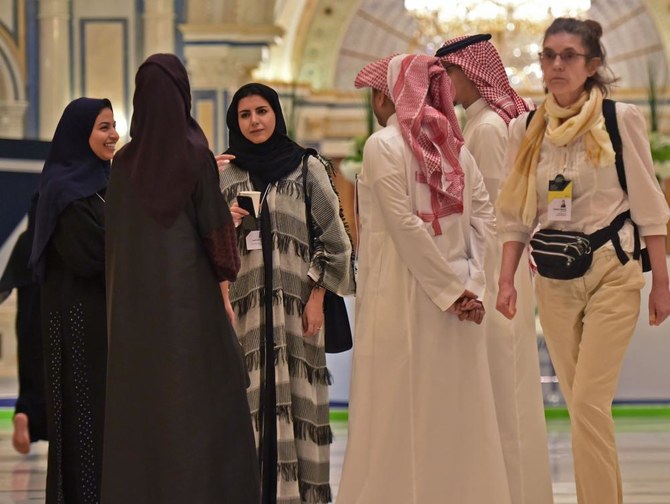RIYADH: The time has come to hang another Future Investment Initiative badge on the lanyard tree in Kane Castle, and wrap up from Riyadh for another year. That’s three in a row I’ve attended now. If the event is staged in the same form next year (see below) surely I’ll qualify for some kind of loyalty reward — maybe special “light search” status through the airport-type security on each entrance to the Ritz Carlton? Or diner a deux with Pepper the robot?
You can probably tell my mind is wandering, but FII has that effect on you. A combination of early-morning starts, Riyadh rush-hour driving and Ritz Carlton security — followed by the zappy mind blast that is the FII experience — tend to make your train of thought a bit random. So, in an effort to bring some order, here is a list of my five top takeaways from FII 2019.
1. The IPO of Saudi Aramco was by far the hottest topic at the show. From the very first morning, when local media reported that a date had been set for the long-awaited share sale, the question I heard most over the three days was: Is it on? Virtually every financial panel had some line on the IPO, and it was the top dinner-table topic of conversation too. Over the past three years, the future of the Kingdom has become inexorably intertwined with the Aramco IPO. We should not have much longer to wait now.
2. Sustainability has come off the tick-box list and is now being taken seriously by the world’s big decision-makers. In 2017, at the first FII, concerns about climate change and the environment were paid lip-service, but you got the impression it was only to put a cross in the appropriate ESG box. In 2019, many speakers made sustainability the top items in their keynotes, including the Saudi energy minister Abdul Aziz bin Salman with his “circular carbon economy.” There is nothing so potent as an idea whose time has come.
3. The future will be smart, and automated. Aramco was the biggest single conversation topic, but more official time was taken up by technological innovation, artificial intelligence, robotics, digital infrastructure and the rest of the “smart” revolution. One of the mind-boggling facts on offer was that Saudi Arabia has the second-highest level of per capital spend on technology, only behind gadget-crazy Japan. Pepper the robot was only the tip of an iceberg of automated floor cleaners, autonomous cars and more apps than you could imagine existed.
4. It’s still the people that make FII a success. One of the great pleasures of walking the hangar-like halls and corridors of the Ritz Carlton complex is the random meeting. You’re having a quick nicotine fix on the terrace and find yourself beside Masayoshi Son of SoftBank (there purely to get some air and escape the frigid air-conditioning). It’s disconcerting, to say the least. Some of the best meetings begin this way. I randomly bumped into British businesswoman Amanda Staveley, for example, and heard intriguing whispers of big deals ahead the football world. A few candid minutes with former White House communications director Anthony Scaramucci produced some unprintable anecdotes and a firm conviction that Donald Trump would not be president again.
5. There are some serious choices to be made about FII 2020. After a successful third event in which it has established itself as the premier thought-leadership event in the Middle East — living up to the “Davos in the Desert” sobriquet — in 2020 FII will find itself with come serious competition. Next November, the Kingdom will host the G20 gathering of world leaders, perhaps the ultimate event in the global forum space. Is Riyadh big enough for both of them within a few weeks of each other? We shall see.
































